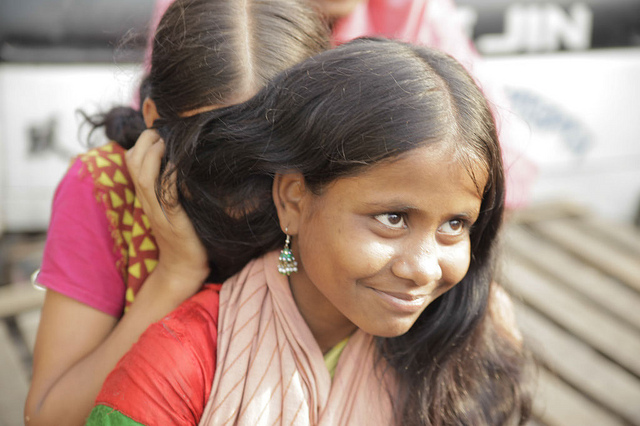To what extent does marriage age affect family nutrition outcomes? It has long been common practice in Bangladesh for girls to marry early—before their 18th birthday. Girls who marry young are more likely to become pregnant while in their teens. Teen pregnancies tend to have a higher risk of birth complications, and babies born to young mothers often have low birth weights, which are closely linked to child stunting. Thus, reducing early marriage can help to improve child nutritional status in Bangladesh.
Researchers from IFPRI’s Policy Research and Strategy Support Program (PRSSP) used 2015 Bangladesh Integrated Household Survey (BIHS) data to assess who is getting married, at what age, and why. On the factors that determine marriage age, the data are clear: money matters. 15.6 percent of girls from the poorest one-third of families got married under 15, compared to 8.6 percent of girls from the richest one-third. In other words, poor families marry off daughters under age 15 twice as much as rich families. This may be because families that marry off younger girls pay a lower dowry to the groom’s family—an attractive prospect for struggling households.
Although families may save in the short term from paying lower dowries for their young daughters, these girls may have a harder time in the long run finding jobs and earning decent incomes. This is because younger brides stop going to school earlier. IFPRI has found that girls who marry before age 15 go to school just half as long as those who marry between the ages of 24 and 26. About 73 percent of girls who married early had their first child by age 20, and nearly half of girls had their first child as a teen.
Amid these troubling findings, however, there is some good news: Over the past 20 years, early marriages in Bangladesh have dropped considerably. The incidence of girls under 15 getting married has dropped by 66 percent, putting the country on track to achieve the government’s goal of zero under 15 marriages by 2021. Similarly, more adolescent males are now delaying marriage until their early to mid-twenties.
Bangladesh has made remarkable progress reducing early marriage among girls under age 15, but progress is faster in some regions than others. Khulna had the greatest reduction of girls under 15 getting married—71 percent. Sylhet, too, is closer to making marriage of under 15 girls obsolete (dropping from 10.1 to 2.2 percent). However, with only a slight decline in the marriage incidence of girls between ages 15 and 18, this warrants more attention.
By reducing early marriage, we are closer to eradicating other related issues such as child stunting and improving gender parity. PRSSP will continue to mine the rich and high-quality BIHS data in order to better understand why early marriage trends are changing in rural Bangladesh.
Akhter Ahmed is the IFPRI Country Representative in Bangladesh, Chief of Party of the Bangladesh Policy Research and Strategy Support Program, and a Senior Research Fellow in IFPRI’s Poverty, Health, and Nutrition Division. Farha Sufian is a Senior Research Assistant and Julie Ghostlaw a Program Coordinator in the Bangladesh Policy Research and Strategy Support Program.
These findings are based on a report submitted to the Governance Innovation Unit of the Prime Minister’s Office, Government of the People’s Republic of Bangladesh in November 2016. For more information, please contact the corresponding author: Dr. Akhter Ahmed. This post appeared originally on IFPRI’s Bangladesh Country Office site.







